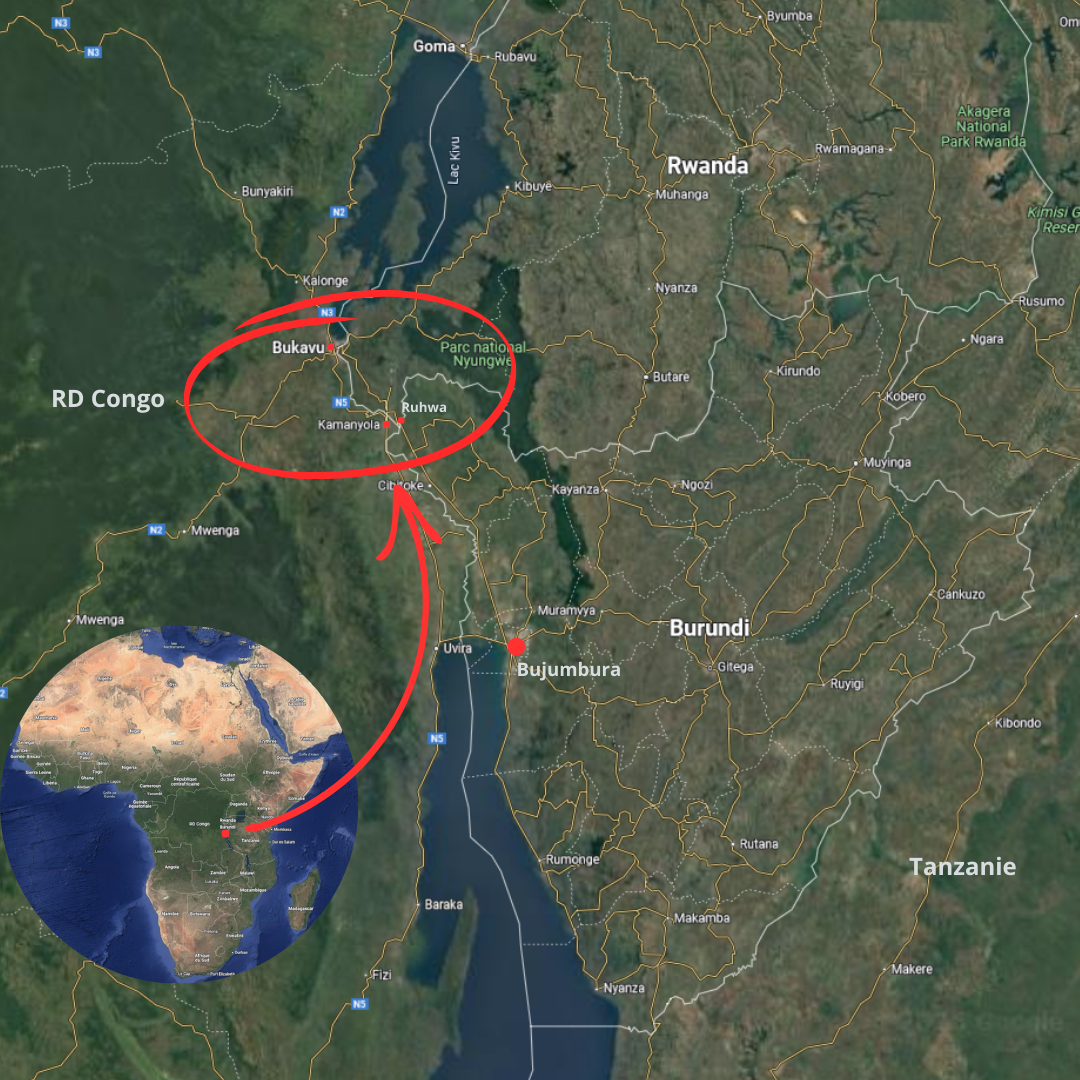
From the Burundian hill of Rukana I, just before arriving at the Ruhwa border post, in north-western Burundi, one can see, opposite, the Rwandan hills which house a military camp and, on the left, the village of Kamanyola, in the Democratic Republic of Congo (DR Congo). Since January 26 and the capture of Goma, in North Kivu, and despite the call for a ceasefire launched on February 8 by all the countries of the region gathered at an extraordinary summit in Tanzania, the M23 armed group, supported by soldiers from the Rwanda Defence Force (RDF), has continued its progression in South Kivu: on February 14, the rebels seized Kavumu airport, 30 kilometers from Bukavu. The latter fell into the hands of the M23 on February 16. Kamanyola is only 50 kilometers south. This war has already caused at least 3,000 deaths since the end of January, according to the UN.
If on the Burundian side the situation still seems calm, concern is growing: the Burundi National Defense Forces (FDNB) are engaged alongside the Armed Forces of DR Congo (FARDC), in difficulty and mobilized to secure Bukavu. Burundi also fears an alliance of circumstance between the M23 rebels, the RDF and a Burundian rebel group, the Resistance for a State of Law in Burundi (RED-Tabara), formed in South Kivu by the protagonists of an attempted coup d’état aborted in 20151.
Rough relations between Bujumbura and Kigali
Questioned by Afrique XXI, numerous witnesses from Bukavu testify to the difficulties encountered in returning to Burundi. The Gatumba border post, west of Bujumbura, is the only one officially still open, intermittently, with DR Congo. Many Congolese are already fleeing the region in anticipation of future fighting, several concordant sources confirm.
The conflict only exacerbates the already execrable relations between Bujumbura and Kigali. More than a year ago, Burundi decided to close its border with Rwanda. President Évariste Ndayishimiye then accused his neighbor of harboring members of RED-Tabara, which his Rwandan counterpart Paul Kagame denied. Free movement with neighboring countries is however vital for many Burundians: for several years, due to a chronic fuel shortage, many of them sought a few liters of gasoline on the other side of the border. The closure has affected a whole section of Burundian economic activity.

Back at the Ruhwa post, on the Rwandan border. National road 5, which leads to Rwanda (before continuing towards DR Congo), is blocked from the customs offices. At the entrance, police officers, few in number despite the war that is knocking on the country’s doors, ensure security. They let through a few rare people who take an old paved road along the fence: a little further on are the thermal waters of the Ruhwa River.
“No one dares to greet people on the opposite bank”
The taxis, motorcycle taxis and tuk-tuks, which used to form long queues to transport passengers on both sides of the border, have almost completely disappeared. Weeds are growing in the middle of the currency exchange offices, shops and dilapidated bistros. There is not much left of what was a small, essential trading center in the province of Cibitoke and its six municipalities. Visitors from Rwanda and DR Congo bought drinks and food there. Chickens were plucked there in the heat of the thermal waters.
The tourism sector is in tatters. The hot waters, renowned for their therapeutic properties, attracted visitors from the two neighboring countries and brought in foreign currency, notably Rwandan francs, the exchange rate of which is advantageous. Although the facilities at the Ruhwa site are basic, explains Jérôme Bukuru, a young guide, he earned more than 60,000 Burundian francs (around 19.50 euros) per day before the border closure. Today, his turnover has dropped to 20,000 francs on weekends and even less on other days.
A little further on, Gloriose (first name borrowed) waits for a motorcycle taxi to go to the Rugombo market, the capital of the province 10 kilometers from the border post. The forty-year-old explains, nostalgically, that Burundians and Rwandans have lived in harmony for decades. They exchanged food and non-food products and visited each other regularly, without constraint: “It is now unthinkable to enter Rwandan territory. Even when we go to the Ruhwa River to draw water, no one dares to greet people on the opposite bank, for fear of getting into trouble. We pretend not to know each other, whereas in reality we often have family ties. This is the case for me: we have in-laws, sisters and brothers on the other side of the Ruhwa. But if the Imbonerakures2 catch us talking, they take us directly to the Mugina prison.”
“My income has become insufficient”
When a person is arrested, she adds, investigations are also carried out on the other members of the family, who can be arrested in turn. “The losses are not only ours,” she continues. “They are also those of the Rwandans. We bought clothes and fish from them, and we sold them beans, corn and cassava. It was the Rwandan money that attracted us. When we exchanged the Rwandan francs, it really brought us a lot.”
The province of Cibitoke runs along the borders of Rwanda and DR Congo. The inhabitants live mainly from agriculture, livestock and small, often informal trade. The closure of the border with Rwanda and, now, the war in Kivu, which threatens to cut off access to DR Congo, have considerably degraded the living standards of the inhabitants. Traders from the Rugombo market explain that they mainly exported tomatoes and cassava for processing into flour: “Rwanda has a tomato processing industry, which allowed us to sell our production at an advantageous price. Especially since the Rwandan franc has a high value: 1,000 Rwandan francs can be exchanged for 5,000 Burundian francs.” On their return, these same traders brought back other foodstuffs, clothing, kitchen utensils, basins and plastic buckets, which were cheaper in Rwanda than in Burundi.
André (name borrowed), a father of seven in his fifties, says the same thing. He exported lemons and tangerines to Rwanda: Lemons, which currently sell for around 100,000 Burundian francs in Burundi, were worth 700,000 francs before in Rwanda. Today, my income is insufficient to cover the needs of my family."
Growing concern among cross-border commuters
The transport sector is suffering the full force of these multiple border crises. At the Rugombo bus stations, taxi and motorcycle taxi drivers wait desperately for customers. Before, they came from Rwanda and Bukavu. To this absence of activity is added the problem of the fuel shortage, as Claude (first name borrowed) recounts: "Gasoline has become a real headache: all the service stations are dry. Since the closure of the border with Rwanda, DR Congo was the only country where we could buy fuel. A liter and a half bottle were sold for 18,000 francs. Today, it costs 30,000, because many people have given up crossing the Rusizi River to buy it, because of fear.
For the more fortunate, it is still possible to go to Rwanda from Burundi by plane. This is the only means of transport allowing you to reach Kigali directly from Bujumbura, but tickets are unaffordable for Burundians. By road, you now have to make a detour via Tanzania, which borders both countries, to the east. Two Burundian families living in Kigali and returned to Burundi in December 2024 for administrative procedures recount: “We had to go through Tanzania via the Kobero border post (in the north-east of Burundi). The journey took almost a day, whereas normally you can reach Bujumbura from Kigali in five hours. We used to pay 20,000 Rwandan francs (around 34 euros). Now, you have to pay 50,000 Rwandan francs : a considerable increase.”
The advance of the M23 in South Kivu fuels the growing fear of border residents for their safety. They say they fear that the armed group will enter Burundian territory in retaliation for the FDNB’s support for DR Congo.
“We will be the first victims”
“Since the M23 and its Rwandan ally attacked South Kivu, we are afraid. According to some rumors, when they have taken the Congolese towns near Burundi, they could attack Burundi. When the war breaks out, we will be the first victims. Economic activities will be paralyzed and we will be forced to take refuge inside the country,” testifies Richard (first name borrowed), a resident of the Buganda commune, north of Bujumbura.
The president of Burundi also believes that war could break out in his country at any moment. Évariste Ndayishimiye called on the inhabitants of the border areas to be vigilant: “I have already told you: be careful! You know that our bad neighbor [Rwanda, editor’s note] is preparing evil for us. But I have already warned him. [If we are attacked], we will defend ourselves. Do not be afraid; we have known each other for a long time! (...) We will not accept to be killed like the Congolese, these living men whom we slaughter like goats!” he launched, on February 11, to the inhabitants of the Bugabira commune, on the Rwandan border.
If you believe in the importance of open and independent journalism:

